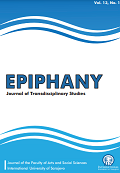ACADEMIC SELF-EFFICACY, GENDER AND ACADEMIC PROCRASTINATION
ACADEMIC SELF-EFFICACY, GENDER AND ACADEMIC PROCRASTINATION
Author(s): Oluwagbemiga Samson AjayiSubject(s): Gender Studies, Education, Higher Education , Educational Psychology, Behaviorism, Evaluation research
Published by: International University of Sarajevo
Keywords: academic procrastination; self-efficacy; procrastinatory behaviour;
Summary/Abstract: Academic procrastination has been described as a behaviour in which academic tasks such as preparing for exams, preparing term papers, managing administrative affairs related to school and fulfilling attendance responsibilities are postponed till another time. Research findings have supported the fact that this habit stems from either failure in self-regulation (passive procrastination) or from utilitarian purposes (active procrastination). This study explores the prevalence of academic procrastination and the prevalent type of procrastinators among undergraduate students. It also examines the difference in academic self-efficacy of passive and active undergraduate procrastinators, as well as gender association between passive and active undergraduate procrastinators. It further determines gender difference in procrastinatory behaviour of university undergraduates. A descriptive survey design was adopted. A total of 200 undergraduate students randomly selected from five faculties from University of Ilorin constitute the sample size for this study. Three research instruments used to collect data for this study are: College Academic Self-Efficacy Scale (CASES), Tuckman Academic Procrastination Scale (TAPS) and Active Procrastination Scale. Results reveal that 29.0% of undergraduate students are procrastinators and 51.7% of the procrastinators are the passive type. No significant difference is found in academic self-efficacy of passive and active procrastinators, t (56) = 1.038, p > .05, and gender is not significantly associated with passive and active undergraduate procrastinators, χ2 (n = 58) = 1.752, df = 1, p = .186. It has also been found that no significant gender difference exists in procrastinatory behaviour of male and female university undergraduates, t (56) = .168, p > .05. This study concludes that most of the university undergraduates that engage in procrastinatory behaviour are passive in nature and neither academic self-efficacy nor gender of the students is a significant factor in their procrastinatory behaviour.
Journal: Epiphany. Journal of Transdisciplinary Studies
- Issue Year: 13/2020
- Issue No: 1
- Page Range: 75-84
- Page Count: 10
- Language: English

